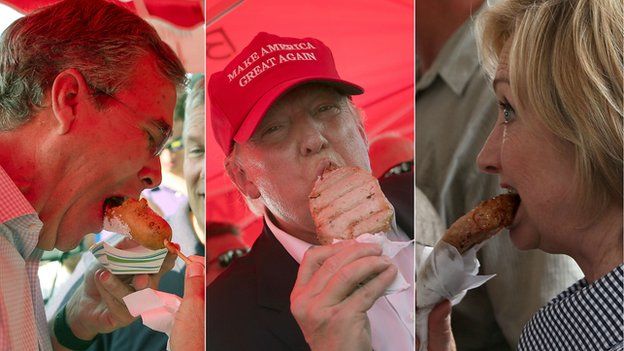Does weight matter in US presidential elections?
- Published

US presidential hopefuls are making the customary stop at the Iowa State Fair this weekend. That means it is time for a classic campaign moment, devouring some of the fair's signature food.
Hillary Clinton and Donald Trump chose pork chop-on-a-stick, while Jeb Bush went for a deep fried Snickers bar. Mike Huckabee told reporters his wife had to stop him from overeating in the Iowa Pork Tent.
Humanising the candidates by showing them indulging in humble fare is a well-known photo opportunity, though it can also be calorically immodest.
Strangely, that is directly at odds with US voters' current preference for trim leaders. In fact, as high-profile names seek the nation's highest office in 2016, experts say their weight could deeply affect their political clout. It wasn't always thus.
Historical legend has it that America's heaviest president, William Howard Taft, once became stuck in a bathtub and required the assistance of six men to free him.
The 27th president of the United States weighed nearly 340lbs (154kgs), but was luckily spared the harsh glare of television cameras during his White House tenure from 1909 to 1913.
Today, a man of Taft's size would have a much more difficult time winning the nation's highest office.
"There's an increasing pressure to conform to supposedly ideal body standards," says Paul Campos, professor of law at the University of Colorado Boulder.
But, those ideal body standards are frequently changing.
In Taft's day, physical heft was associated with wealth, high social status and power, Campos, the author of the Obesity Myth, says.
The physical and financial largesse of early 20th Century railroad barons even inspired expressions including "fat cats" and "throw your weight around".
But the end of World War One concluded a period of relative scarcity. Plentiful food meant it became more difficult - and thus more attractive - to be physically trim.
Obesity - before the purview of the upper class - soon became associated with a lower socioeconomic status, Campos adds.
Soon a cult of thinness was born, which exists to this day, University of California, Los Angeles sociology professor Abigail Saguy says.
The author of What's Wrong with Fat? argues obesity has since become heavily stigmatised in American culture, and such negative views can hurt a larger candidate's chances with voters.
"We live in a society in which it is just so deeply ingrained and so taken for granted that it is better to be thin and worse to be fat, in terms of health, morality, attractiveness, everything," Saguy says.
Pop culture, 24-hour news, movies and magazines encourage a "halo effect" around the thin and attractive, she adds. This means voters can ascribe positive qualities to a candidate which they may not in fact possess.
The opposite can also hold true for heavier candidates, who may be unfairly perceived by voters as lazy, impulsive or unhealthy.
That hasn't stopped larger men, including Republicans Chris Christie and Mike Huckabee, from running, however.
According to US media, Christie told a group of Republican donors last September he had shed 85lbs after surgery in 2013, adding it was critical to his long-term political prospects.
After a diagnosis of Type 2 diabetes, Huckabee went on to lose more than 100 pounds. He even later wrote a motivational book about the experience, titled Quit Digging Your Grave With a Knife and Fork.
Even former Florida Governor Jeb Bush has got in on the weight loss action. The Republican candidate employed a personal trainer and dropped several pounds in a recent push for the White House. He's reportedly on a Paleo diet, but must have made an exception for the deep-fried Snickers.
America's largest leaders by body mass index:
- William Howard Taft, served from 1909-1913
- Grover Cleveland, served from 1885-1889, 1893-1897
- William McKinley, served from 1897-1901
- Zachary Taylor, served from 1849-1850
- Theodore Roosevelt, served from 1901-1909
But, according to Saguy, none of these 2016 contenders will face as much scrutiny over their appearance as a female candidate, such as former Democratic Secretary of State Hillary Clinton, should she put on the pounds.
"A fat woman is going to face much more prejudice as a political candidate than a fat man, because we're much less tolerant of fatness in women than we are of men," Campos says.
But the one-time first lady may have a secret weapon - her husband, Bill.
While in office, former Democratic president Bill Clinton was considered overweight and frequently lampooned for his well-known love of fast food.
But, in recent years he has publicly adopted veganism and dropped a sizable amount of weight.
If voters view the Clintons as a "package deal", says Campos, it may well help how people physically view Hillary during her run for the White House.
With more than one-third of US adults currently considered obese, more voters may be willing to overlook a few extra pounds as well.
In a July 2014 Vanity Fair poll, when asked how they felt about an overweight president, 64% of respondents said it has nothing to do with getting the job done.
But, even with some positive poll numbers, politicians will continue to be conscious of their appearance, strategist Jim Manley says.
The senior director with QGA Public Affairs says he saw celebrated Democratic Senator Ted Kennedy attempt to slim down prior to embarking on every campaign trail.
"I spent 21 years in the Senate, and it wasn't unusual for members to begin to lose weight before they went into an election cycle," Manley says.
"In this day and age, it's a factor that everyone, either male or female, has to be cognisant of."
- Published27 January 2015